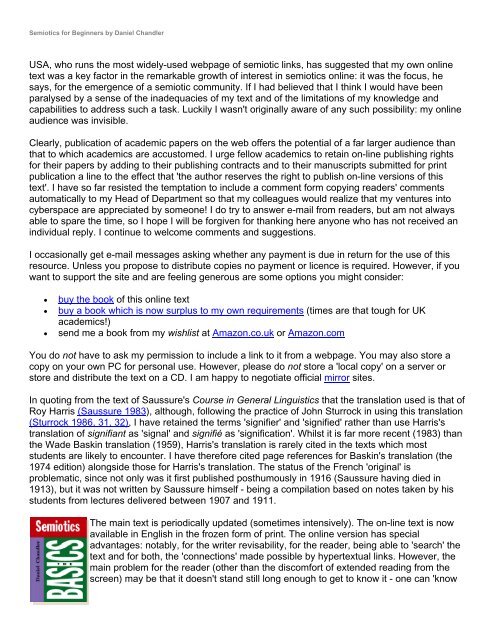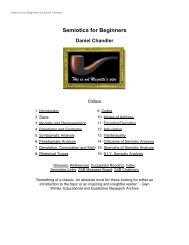Semiotics for Beginners by Daniel Chandler
Semiotics for Beginners by Daniel Chandler
Semiotics for Beginners by Daniel Chandler
Create successful ePaper yourself
Turn your PDF publications into a flip-book with our unique Google optimized e-Paper software.
<strong>Semiotics</strong> <strong>for</strong> <strong>Beginners</strong> <strong>by</strong> <strong>Daniel</strong> <strong>Chandler</strong><br />
USA, who runs the most widely-used webpage of semiotic links, has suggested that my own online<br />
text was a key factor in the remarkable growth of interest in semiotics online: it was the focus, he<br />
says, <strong>for</strong> the emergence of a semiotic community. If I had believed that I think I would have been<br />
paralysed <strong>by</strong> a sense of the inadequacies of my text and of the limitations of my knowledge and<br />
capabilities to address such a task. Luckily I wasn't originally aware of any such possibility: my online<br />
audience was invisible.<br />
Clearly, publication of academic papers on the web offers the potential of a far larger audience than<br />
that to which academics are accustomed. I urge fellow academics to retain on-line publishing rights<br />
<strong>for</strong> their papers <strong>by</strong> adding to their publishing contracts and to their manuscripts submitted <strong>for</strong> print<br />
publication a line to the effect that 'the author reserves the right to publish on-line versions of this<br />
text'. I have so far resisted the temptation to include a comment <strong>for</strong>m copying readers' comments<br />
automatically to my Head of Department so that my colleagues would realize that my ventures into<br />
cyberspace are appreciated <strong>by</strong> someone! I do try to answer e-mail from readers, but am not always<br />
able to spare the time, so I hope I will be <strong>for</strong>given <strong>for</strong> thanking here anyone who has not received an<br />
individual reply. I continue to welcome comments and suggestions.<br />
I occasionally get e-mail messages asking whether any payment is due in return <strong>for</strong> the use of this<br />
resource. Unless you propose to distribute copies no payment or licence is required. However, if you<br />
want to support the site and are feeling generous are some options you might consider:<br />
• buy the book of this online text<br />
• buy a book which is now surplus to my own requirements (times are that tough <strong>for</strong> UK<br />
academics!)<br />
• send me a book from my wishlist at Amazon.co.uk or Amazon.com<br />
You do not have to ask my permission to include a link to it from a webpage. You may also store a<br />
copy on your own PC <strong>for</strong> personal use. However, please do not store a 'local copy' on a server or<br />
store and distribute the text on a CD. I am happy to negotiate official mirror sites.<br />
In quoting from the text of Saussure's Course in General Linguistics that the translation used is that of<br />
Roy Harris (Saussure 1983), although, following the practice of John Sturrock in using this translation<br />
(Sturrock 1986, 31, 32), I have retained the terms 'signifier' and 'signified' rather than use Harris's<br />
translation of signifiant as 'signal' and signifié as 'signification'. Whilst it is far more recent (1983) than<br />
the Wade Baskin translation (1959), Harris's translation is rarely cited in the texts which most<br />
students are likely to encounter. I have there<strong>for</strong>e cited page references <strong>for</strong> Baskin's translation (the<br />
1974 edition) alongside those <strong>for</strong> Harris's translation. The status of the French 'original' is<br />
problematic, since not only was it first published posthumously in 1916 (Saussure having died in<br />
1913), but it was not written <strong>by</strong> Saussure himself - being a compilation based on notes taken <strong>by</strong> his<br />
students from lectures delivered between 1907 and 1911.<br />
The main text is periodically updated (sometimes intensively). The on-line text is now<br />
available in English in the frozen <strong>for</strong>m of print. The online version has special<br />
advantages: notably, <strong>for</strong> the writer revisability, <strong>for</strong> the reader, being able to 'search' the<br />
text and <strong>for</strong> both, the 'connections' made possible <strong>by</strong> hypertextual links. However, the<br />
main problem <strong>for</strong> the reader (other than the discom<strong>for</strong>t of extended reading from the<br />
screen) may be that it doesn't stand still long enough to get to know it - one can 'know




